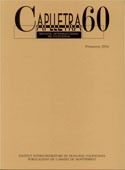Binary connective constructions in parliamentary debate
DOI:
https://doi.org/10.7203/caplletra.60.7926Keywords:
binary relations, connective binary constructions, argumentation, parliamentary debate, discursive genre Abstract
Abstract
Abstract: Parliamentary debate is essentially an argumentative genre because members of parliament defend a stance regarding a topic of discussion. This position is embodied in argumentative structures, parts of which are often defined by binary connectives (mostly causal and consequence, but also conditional, final, adversative and concessive). The aim of this paper is to analyse such constructions both linguistically and argumentatively in a corpus composed of three debates in Catalan taking place in the Parliament of Catalonia. The analysis is made both from a local perspective (case by case) and from a global perspective (each case integrated into the discursive chain). Firstly, our data are compared with the results of previous studies dealing with the relationship between discursive genre and the use of connectives (Castellà 2001; Cuenca 2013a). Secondly, the relationship between the uses of connectives and the degree of formality and preparation of parliamentary debate is discussed. Finally, the discourse construction and individual style of each Member of Parliament is analysed according to chain and coherence relationships as well as in terms of the type of argumentative order and movement.
Key words: binary relations, connective binary constructions, argumentation, parliamentary debate, discursive genre.
 Downloads
Downloads
Downloads
Published
How to Cite
-
Abstract362
-
PDF (Català)280
Issue
Section
License
Authors submitting work to Caplletra for publication must be the legitimate holder of the usage rights. Legitimacy for the purposes of publishing the work must also include images, tables, diagrams and any other materials that may complement the text, whether they are the author of such material or not.
Copyright: on publishing their work in the journal, the author grants Caplletra. Revista Internacional de Filologia usage rights (reproduction, distribution and public communication) for both the paper printed version and for the electronic version.
All work published in Caplletra is covered by the Creative Commons license type Attribution-NonCommercial-NoDerivatives 4.0 (CC BY-NC-ND 4.0).
RESPONSABILITY
Caplletra. Revista Internacional de Filologia does not necessarily identify with the points of view expressed in the papers it publishes.
Caplletra. Revista Internacional de Filologia accepts no responsibility whatsoever for any eventual infringement of intellectual property rights on the part of authors.






